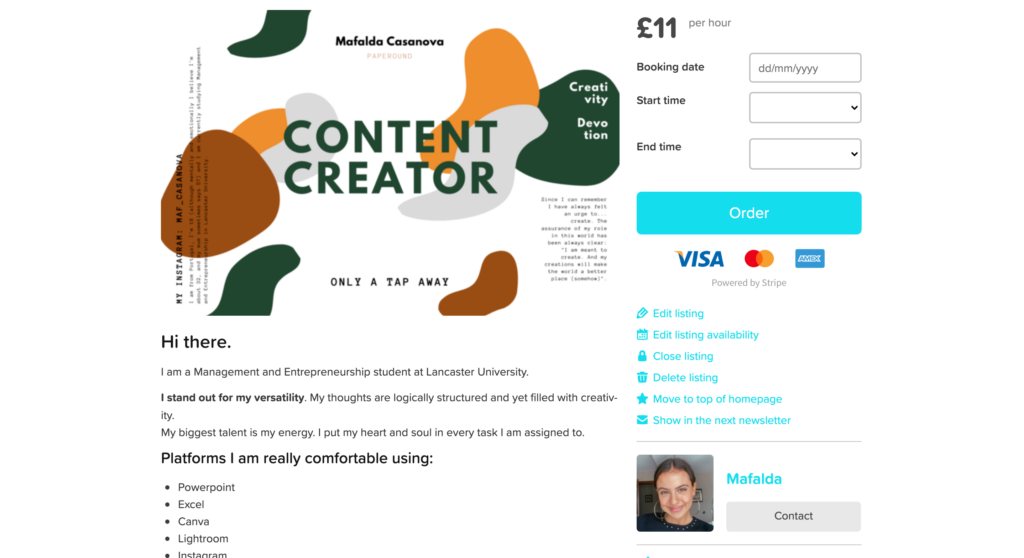This article was first posted on Tech Nation, written by Kane Fulton.
The UK is facing a looming digital skills crisis. At a series of roundtables recently held by Tech Nation and the Digital Economy Council, delegates highlighted the benefits of student internships, namely that they increase the supply of people with relevant skills while giving young people experience of working in tech.
In a post-pandemic world, a new online platform is set to evolve traditional, in-person work experience to provide flexible opportunities for both companies needing digital skills support and university students looking to earn extra cash. Called Paperound, it works by letting students from UK-based universities (called “Taskers”) create a profile listing their skills, the digital tools they use and their availability for work.
Hiring companies can browse and book students to work on ad-hoc tasks remotely and by the hour based on their availability and reviews left by other businesses. Marketing and market research work, ranging from blog writing and social media management to data analysis, is in highest demand and students are booked for an average of four hours per individual task.
Paperound’s Brighton-based CEO Jake Fox (pictured, above) co-founded the company with Billy Rebecchi, its CTO, in January this year. Noticing how difficult it was to access student resources efficiently – even though students are desperate for the work – Jake wanted to provide startups and SMEs with an alternative to traditional internships, which he says can be rigid in nature, hard to find and contrast with startups’ agile ways of working.
“With internships, companies have to decide when to hire interns, where to get them from and how they are going to fill their time,” he says. “In reality, founders and small business owners should be spending their time on more important work – they want students that can jump on a task that anybody can do, quickly.”

Paid work
Students are interviewed and vetted before being accepted onto the platform, a decision that Paperound’s founders made with value in mind. Jake says that this rigorous process ensures businesses are hiring “hard-working students with initiative and good communication skills”, all while promoting equal opportunity between students across the UK’s range of universities including world-renowned institutions and lesser-known colleges.
All work on Paperound is paid and the rates are set by the students, Jake stresses, with tasks typically booked out at the average graduate rate of £10-£12 per hour and always at least minimum wage.
“Fundamentally, I believe that hard work should be enough to get you to your next stage in life – it shouldn’t matter where you come from,” says Jake. “If you get given a piece of work and work hard at it, that should be enough for you to unlock more opportunity.”
Shortly after launching, Jake noticed that businesses had begun making repeat bookings on the back of trust built up with Taskers. He sees the relationships forged on the platform as Paperound’s USP and something that sets it apart from “transactional” competitors such as Fiverr, Freelancer.com or Upwork. “With our competitors, people pay freelance consultants to do something but they never go back to them,” he says.
Paperound is now seeing students use their experience on the platform to land longer-term graduate roles. “Since founding the platform, I always thought that if companies gave students a ‘chance’ in the form of ad-hoc tasks, then larger opportunities would likely follow,” says Jake. “The added value in Paperound is that you’re not just getting more work done efficiently, you’re also discovering your next hire.”

Hooking up
At a glance, Paperound looks like a marketplace and operates like one, taking a percentage of each booking (and only getting paid when its Taskers do). However, Jake sees it as a productivity tool for founders, at its heart. He is developing the platform in this direction by integrating it with popular SaaS productivity tools, removing the need for companies to leave their workflow to book or communicate with Taskers.
In Slack or Trello, for example, a business adds Paperound as a member (with admin rights). That business can then message Paperound directly, or create and assign a Trello card from within the platform, requesting a Tasker to provide three hours of social media support (for example). Paperound then finds a suitable Tasker and connects them with the requester. Hooking into the tool’s API, the platform pulls over information such as the task description, comments and files sent for the student to work on, with the company paying after the task is complete.
For businesses, this provides the advantage of being able to commission work to multiple Taskers at one time through a single interface without having to give their accounts elevated rights in their productivity tool workspaces. Students meanwhile benefit by being able to undertake tasks and projects for several companies simultaneously. For Jake, streamlining the commissioning process for its business users is a necessary and important step to help today’s generation of remote workers find work and fulfil their potential post-pandemic.
“The idea of working flexibly for a few different companies, picking up work that you are good at doing quickly and efficiently, will become the norm,” he says. “We are already seeing it now with freelancers becoming more fluid at picking up jobs. This generation has more natural remote workers than any other, so it makes for them to pick up and crack on with jobs in a slick way.”
Paperound is certainly not lacking in ambition having raised a six-figure pre-seed investment from Jenson Funding Partners in April just four months after incorporating. In addition to developing its core product, Paperound is now looking to increase its marketing output and spread the word on why Taskers are the best resourcing option for busy small businesses.